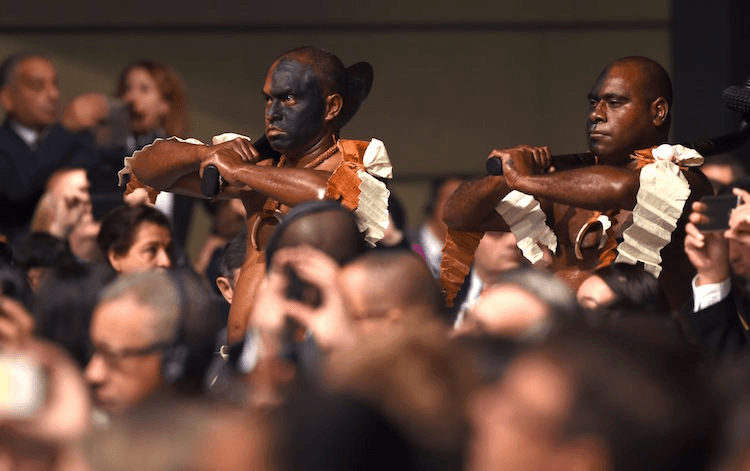In the past three years the Pacific Island nations have experienced the three most intense tropical cyclones on record. It’s our duty as tangata whenua and whanaunga to take a stand on climate change, for their sake, argues Graham Cameron.
As our Pacific Islands cousins face the unprecendented impacts of climate change, they are looking for allies who will support them by taking concrete actions to limit global warming to 1.5oC and will also rehome the now inevitable climate change refugees from low lying Pacific states.
Those allies are precious few. Most nations are long on words and short on action. Aotearoa New Zealand can be counted among the majority, having turned down applications from Kiribati and Tuvalu citizens for climate change refugee status and as a nation having year on year increases in carbon emissions.
If the inaction of Aotearoa is disappointing, the silence of our iwi and other tāngata whenua representatives on the situation for Pacific Islands is incomprehensible. We may be separated by years and distance, but we are Pacific Islands peoples and they are our tuakana.
When Tamatea returned to Rangiātea from Aotearoa, he sought the assistance of his cousin Waitaha to undertake the task of building the Tākitimu canoe and returning to Aotearoa with new knowledge and skills. Waitaha quickly agreed and as a start, gifted a large log named Pūwhenua for the carving.
In that moment, the success and development of Tamatea’s community depended on the knowledge and skill that was retained by their Pacific Islands cousins in Rangiātea; without hesitation, Waitaha and his people provided generous care and support. Eight hundred years on, our tuākana in the Pacific Islands could be forgiven for wondering if we’ve forgotten our stories.
In the past three years the Pacific Islands nations have experienced the three most intense tropical cyclones on record: Winston, Pam and Gita. The damage in various islands of Tuvalu, Solomons, New Caledonia, Vanauatu, Tonga, Samoa, and Fiji has been catastrophic and enduring.
Eight islands in Micronesia have disappeared as a signpost to the coming impacts of sea level rise due to climate change. Kiribati in particular faces a challenging future, already experiencing a reduction in arable land as the water table becomes salinated by the rising ocean.
Yet at international forums on climate change and here in Aotearoa, our Pacific Islands cousins have spoken alone for support and action.
Yet iwi are well aware of the threat that climate change poses. Our Iwi Chairs Forum has a Pou Taiao which gives advice and recommends priorities to the forum on climate change, fresh water and fisheries management. The climate change priorities are all focused on iwi business: whānau, whenua and wai.
This reflects the industries iwi are heavily invested in: property; farming; forestry; and fishing. Climate change is going to have an enormous impact on property and on land and sea-based industries.
Parts of Aotearoa New Zealand will be more drought prone, parts will be wetter, storms – this summer has been a demonstration of what lies in store – will be more intense and damaging. The sea is warming and becoming more acidic which changes where fish breed and move, changes the species of fish and leads to an explosion in pest species (not to mention our doubtful management of fish stocks).
Aside from the fact that we may want to diversify into renewables and digital technologies, of course our iwi need support and advice on how to navigate the changing, warming environment. Surely we are more than a group of Gollums, fixated on protecting our resources.
How we respond to climate change will be a demonstration of what we value and honour.
We articulate values that put relationships at the centre of who we are. Our responsibiliy to manaaki is central to our identity; as we care and protect others, we raise their mana and in the process enhance our own. In word, in writing and in action, for every whānau, at every marae, at our hapū and iwi boards, one value is articulated time and again: manaakitanga.
But it’s a word you won’t find in our iwi work on climate change. In the Iwi Chairs Forum presentation this year at Waitangi, seven actions on climate change were identified: a leadership summit; educative tools; relationship building (again within Aotearoa New Zealand); economic transition; our rangatahi; and a legal/policy stream.
This sends a message that we are about protecting our resources before our relationships. This is a lost opportunity. Manaakitanga, essentially a relational process for protecting and managing people and resources, is what sets us apart. And climate change is a problem desperately seeking alternative solutions.
The old system of negotiating to achieve the best deal for yourself will never mitigate the worst impacts of climate change. Nations have little impetus to help other nations. In our representative democracy, the idea of expending resources on the citizens of other countries is a difficult sell. As tangata whenua, our leadership is not so bound up in polls and popularity.
We have fought hard to regain our economic self-determination. But what for? Surely not to join the race as brown capitalists. Our economic self-determination is about rebuilding the pallisades of our own world. A place for us to fully and safely express our own tikanga.
In climate change, perhaps the greatest threat to our existence our generation will face, we need to find the connections that encourages actions across borders and oceans.
Manaakitanga requires we provide aid and support to our Pacific Islands cousins. We need to be advocating for the acceptance of climate change refugees here, supporting research into innovate mitigation strategies in the Pacific Islands, and standing shoulder to shoulder with them in international forums.
In this moment, the success and development of Pacific Islands communities depends on the knowledge and resource that we have fought to retain here in Aotearoa. Like Waitaha and his people, without hesitation let us provide generous care and support.
